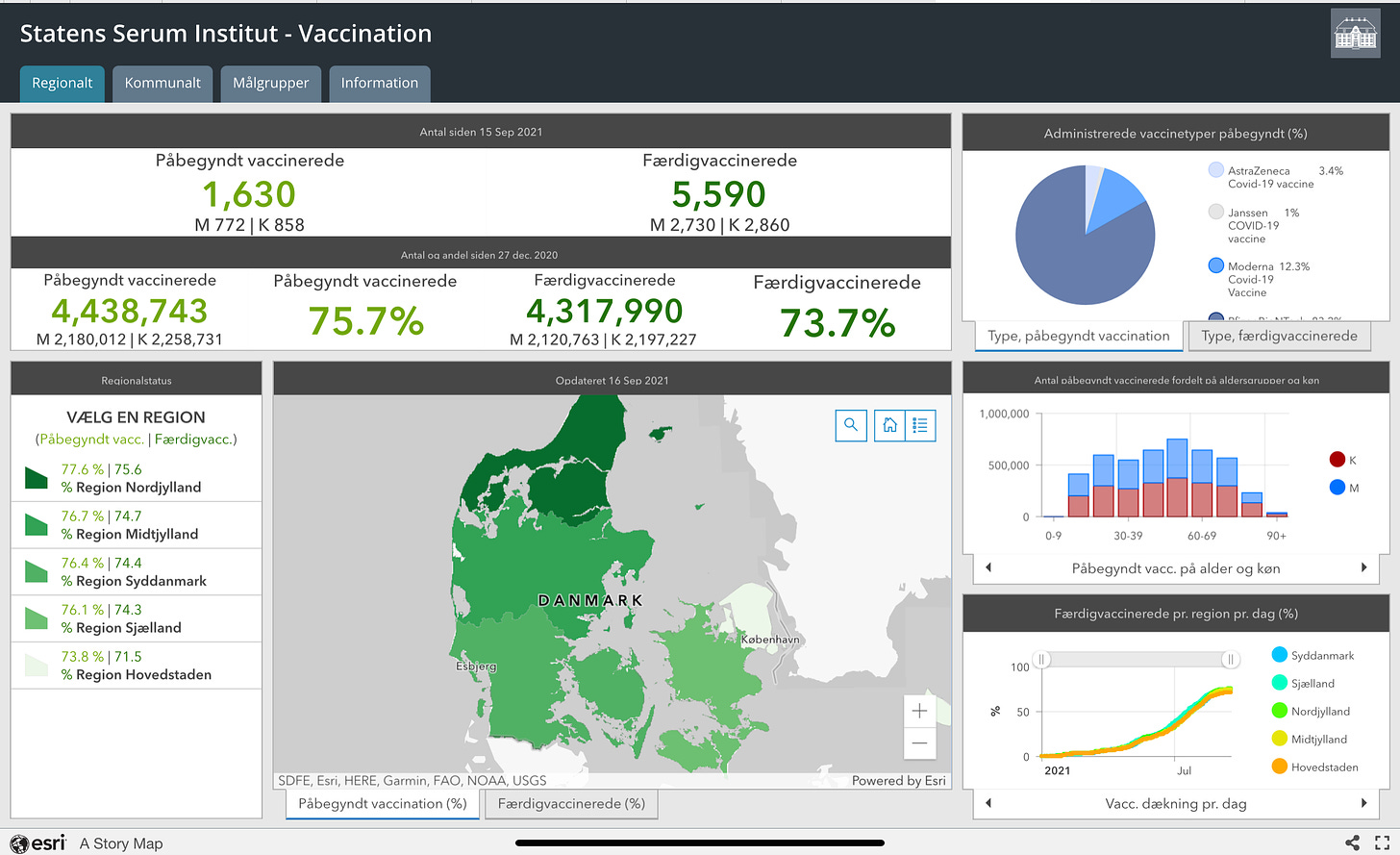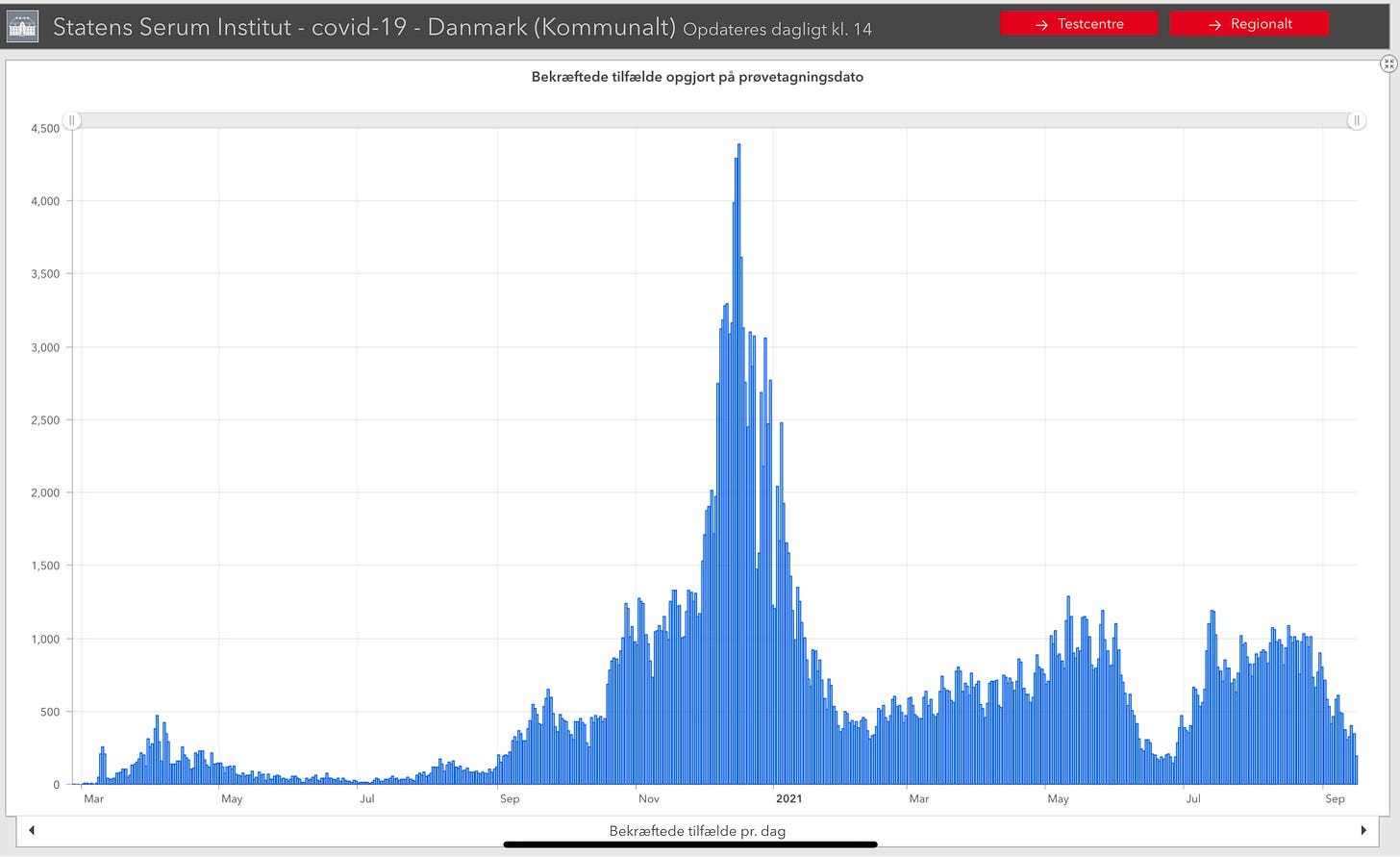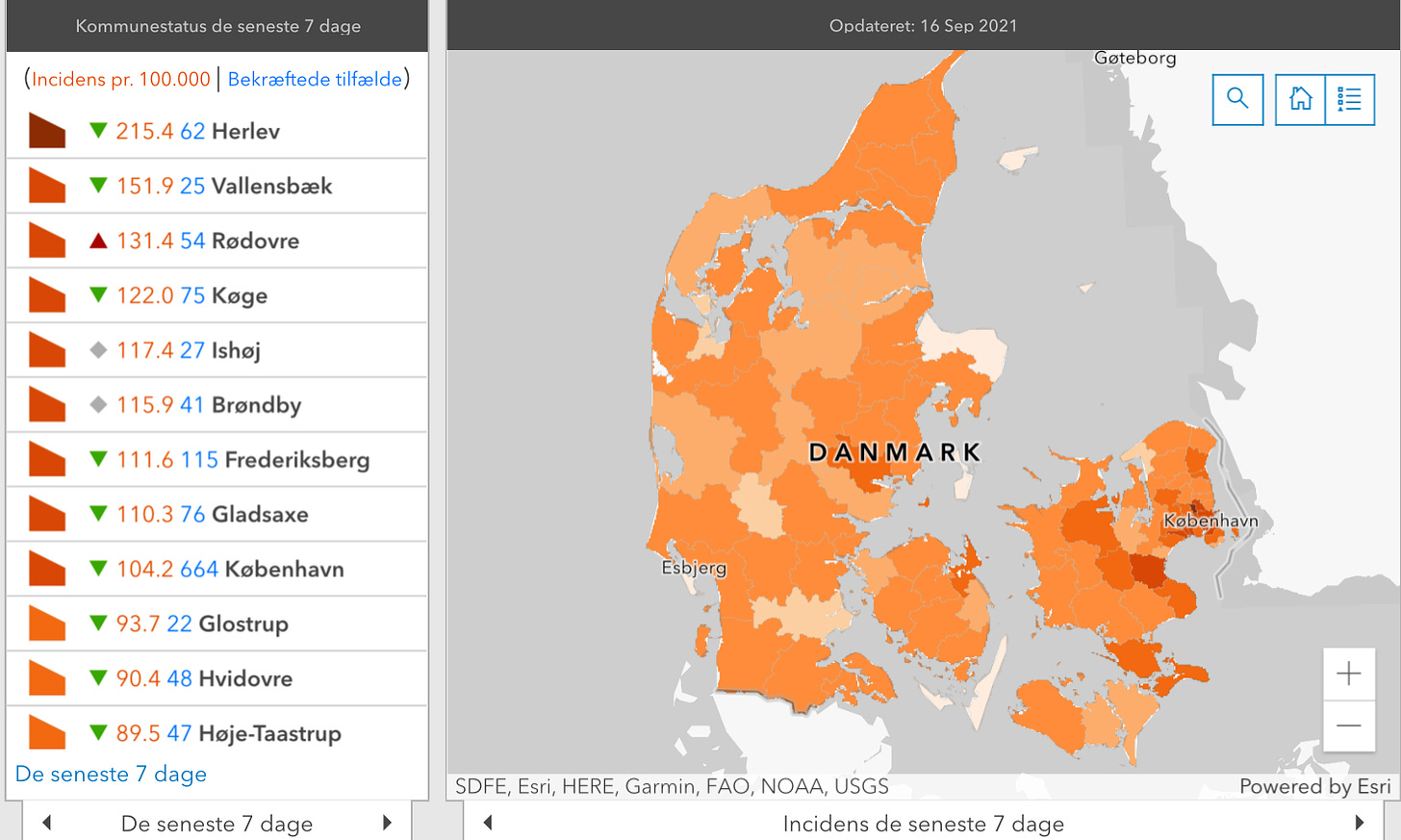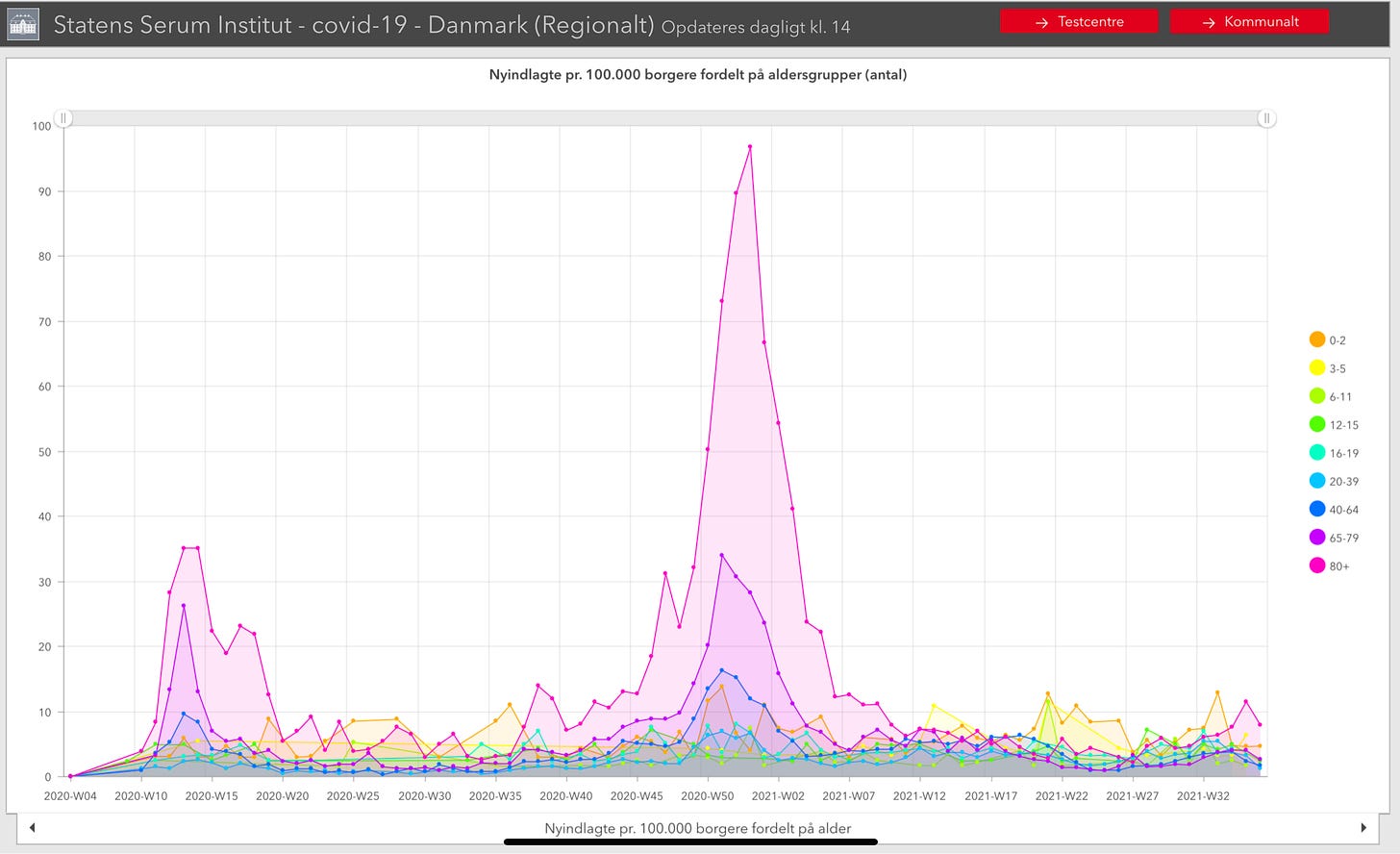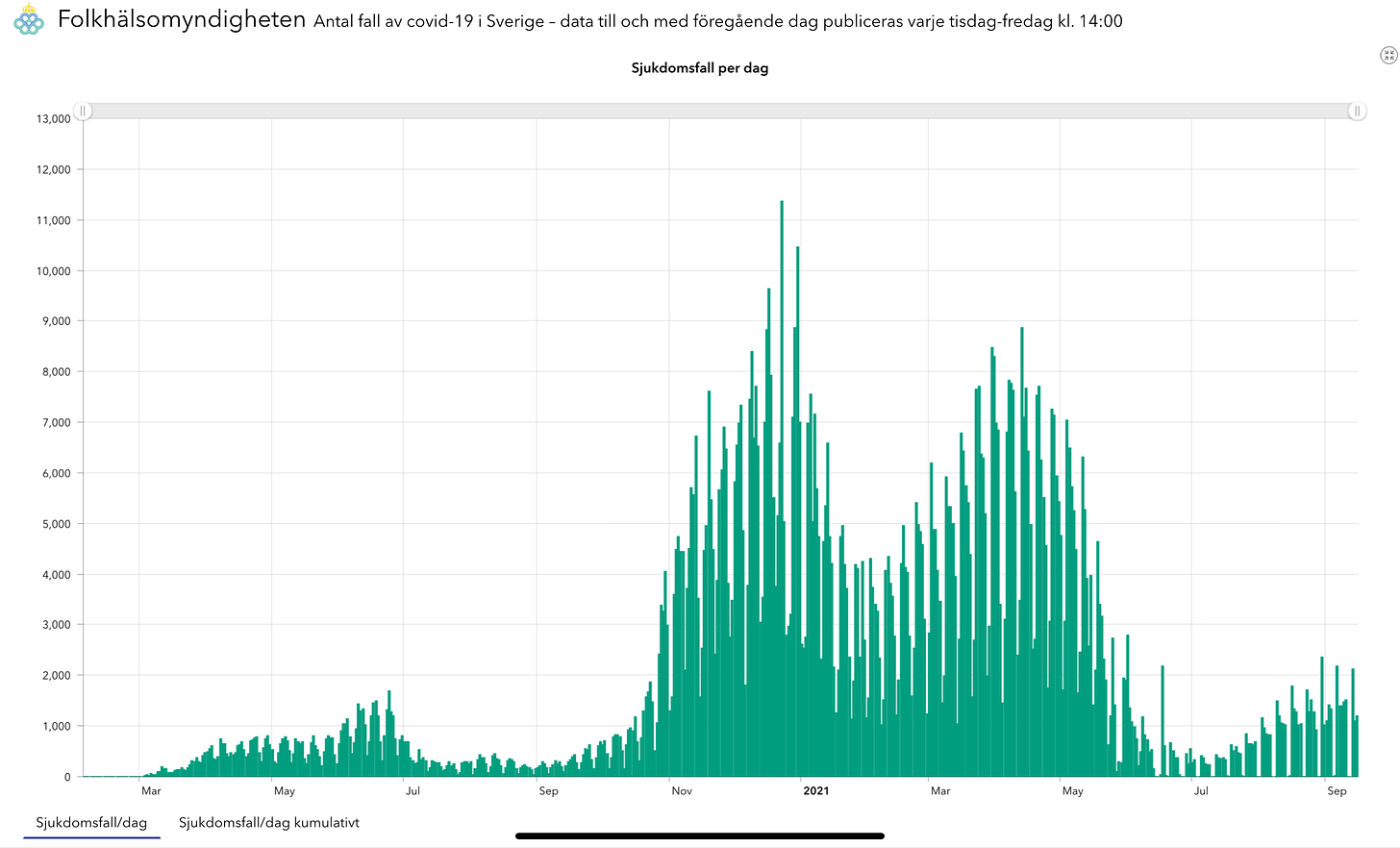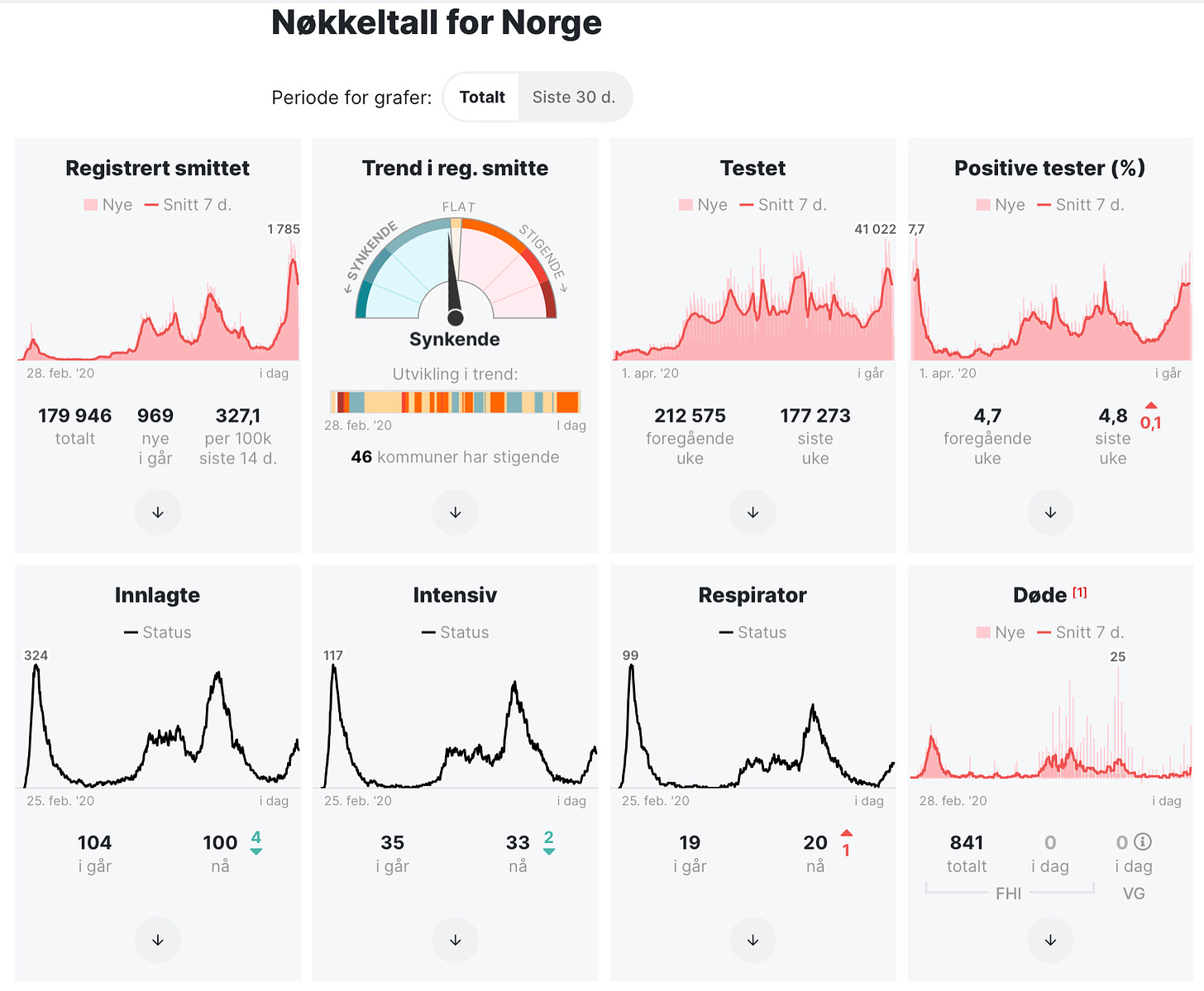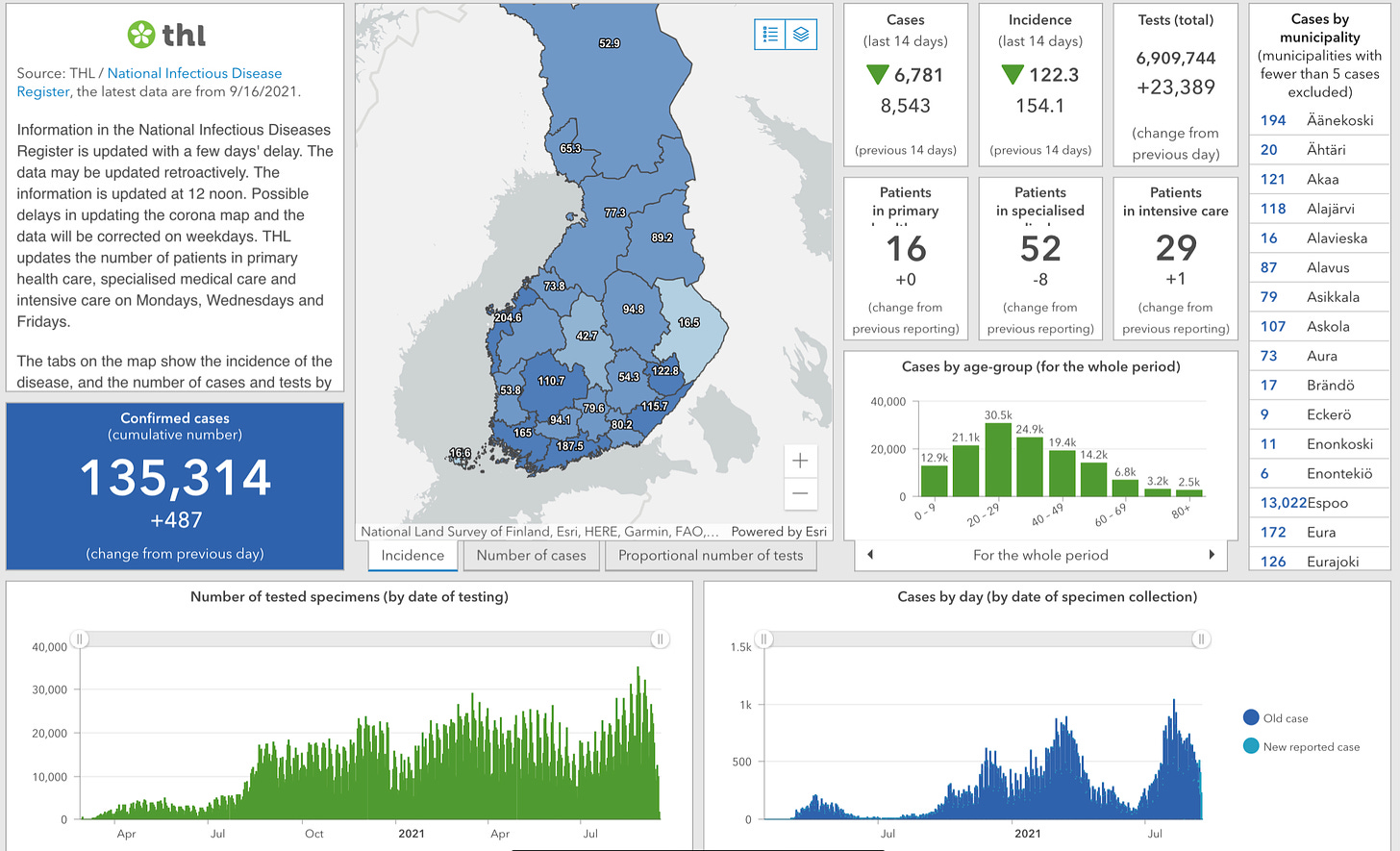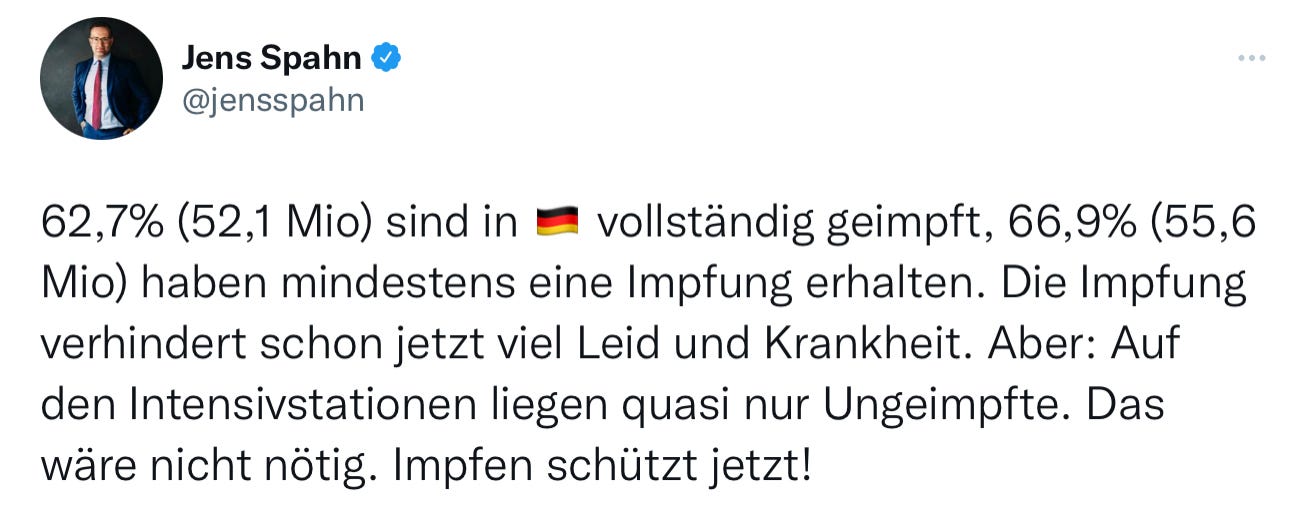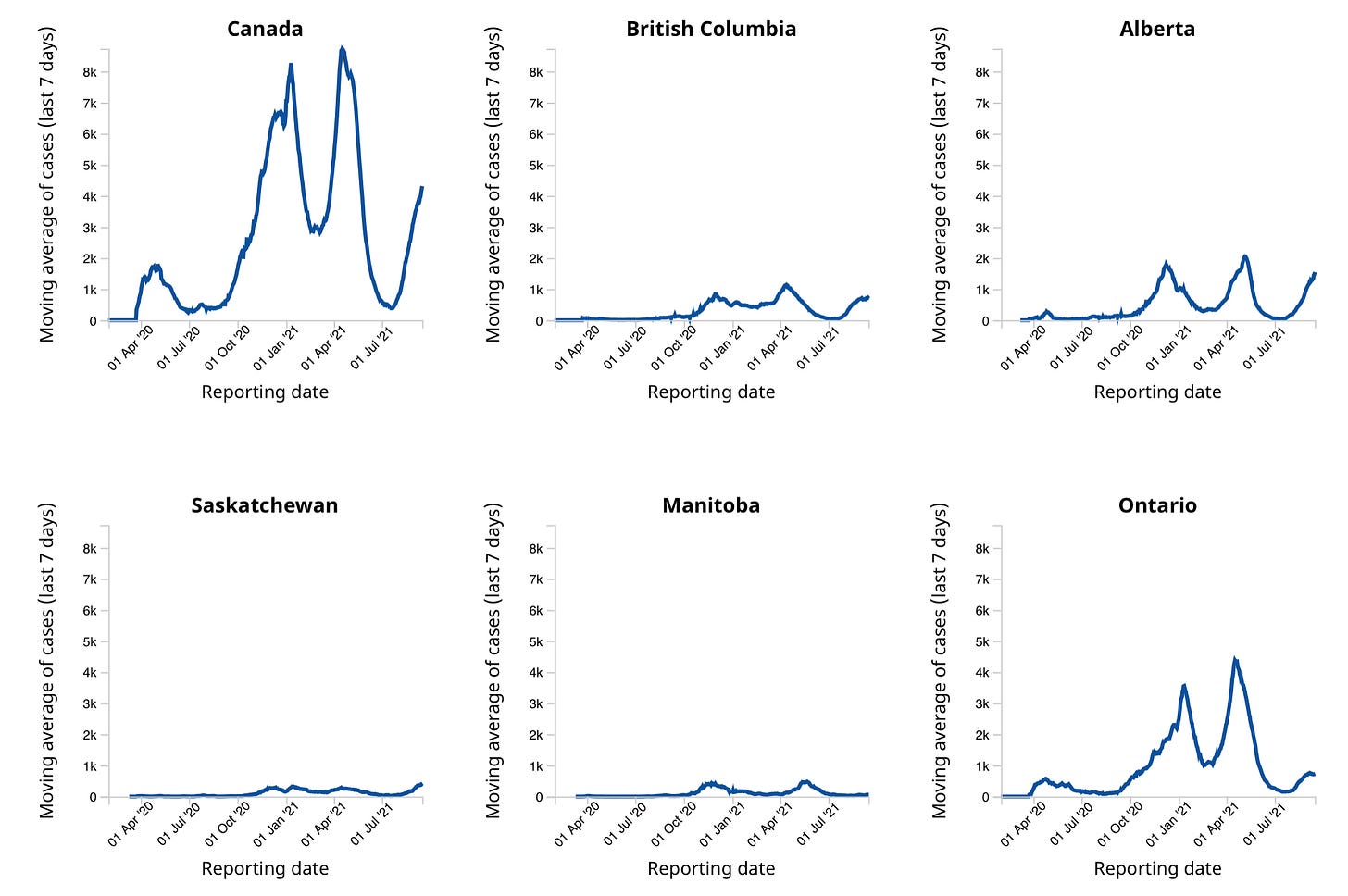🇩🇰
A non-COVID public health warning. West Jutland police say a fire at a factory in Hvide Sande on Wednesday night resulted in iron chloride leaking into nearby waterways. Police advise people stay out of the water in Ringkøbing Fjord from Langsand in Hvide Sande and down to Karen Brands Vej. The water warning extends 1,000 meters off the coast and will remain in place until at least Friday. The chemical is so dangerous that fish and any other marine animals that are caught in the area must be destroyed. Police say anyone who has been in the water should be vigilant for any symptoms.
-
As Denmark faces an explosion of RS virus infections coming much earlier and in numbers way higher than have ever been seen before, an infectious disease expert is warning about the coming flu season. Jens Lundgren, Professor of Infectious Disease Medicine at Rigshospitalet, told Politiken that we may need to recycle COVID restrictions to battle influenza spread.
“In the future, we should use all the useful tools we used against COVID to curb major epidemics. Influenza is coming again and will cause unnecessary deaths, just as the coronavirus will continue to hit us for the many years. I believe we should use contact-reducing measures to briefly, either locally, regionally or nationally, deal with a major epidemic.”
Among the restrictions he is referring to are the wearing of masks, working from home, and maintaining a social bubble of close contact while keeping your distance from others.
He says that this would be only for major epidemics like the threat posed by this year’s influenza season. The flu season can claim anywhere from 500 to 1,500 lives in any given year.
Danish health authorities are preparing a massive flu shot campaign to begin next month to head off a possible twindemic amid warnings about a possibly brutal influenza season to come. Epidemiologists have been warning that due to a lack of exposure to the usual bugs, which were wiped out due to COVID restrictions, that things like influenza could come roaring back in unprecedented numbers.
-
On the vaccination front to date, 4,438,743 1st doses (75.7% of the total population) have been administered while 4,317,990 people (73.7%) have been fully vaccinated. Just 120,753 vaccinations separate 1st and 2nd doses done.
Yesterday there were 7,220 total inoculations done of those 1,630 were 1st doses.
-
The Danish National Health Board is making an interesting change to try and encourage the remaining holdouts to get vaccinated. It will soon allow people to choose which vaccine they want among those authorized for use in the national vaccination campaign. Currently, that is either the Pfizer BioNTech or Moderna vaccines.
The health board says some pop-up vaccination sites began offering people the choice and the result was overwhelmingly positive.
Unit Manager Bolette Søborg:
“We know that some citizens have yet to decide on getting vaccinated. That is why we have made huge efforts to make it easier for people. We know that some citizens have opted out of vaccination because they want to decide for themselves which vaccine to have. Therefore, we have now made it an option that they can choose between the two vaccines.”
As for when exactly the change will come into force, the health board repeatedly uses the phrase “in the future.” It does say this will be specific to people who haven’t yet started the vaccination process. For anyone receiving a booster shot, the third shot will be the same as the person’s first two doses.
-
Denmark is reporting 313 COVID infections and two more coronavirus deaths in the last day.
Yesterday, there were 74,199 total corona tests done, 41,211 PCR and 32,988 rapid, for a (PCR only) positivity percentage of 0.76%.
-
The vastly improved pandemic situation in Denmark is reflected in the infection incidence rate map. There are now just nine kommunes with a COVID incidence rate over 100 per 100,000 residents, and of those just one municipality has an incidence rate over 200.
-
COVID hospitalizations (102) have fallen (-14) while the number of infected people in an ICU (26) also declined slightly (-2) and of those the number on a ventilator (19) edged upward (+1).
-
Building on two previous studies Denmark’s Staten Serum Institut has released a third trying to determine why non-western European ethnic groups have much higher COVID infection rates. This latest effort looked at where and how they live. It found 71% of ethnic non-western European minorities live on less than 40 square meters per person. For native Danes, that number is 36%.
Acting Head of Department Palle Valentiner-Branth:
"When you live on fewer square meters, it must be assumed that it is more difficult to keep your distance from other family members.”
The Danish Agency for Patient Safety’s monthly contact tracing report has ranked ‘family members at home’ as consistently one of the top places people believe they have become infected. Other studies have also proven just how fast COVID can spread in a household when one person becomes infected.
The population density analysis in the study shows the same pattern. Those who live in municipalities with high population density have an increased risk of becoming infected with coronavirus.
However, the study also admits there are still lots of unanswered questions yet.
“It has not been possible to include qualitative factors in the new study. Factors such as cultural differences, religion, language skills, trust in the authorities, attitudes, and traditions and so on. Therefore, it is important to shed light on the complex interplay between the various socio-economic and qualitative factors in order to better explain the inequality we have demonstrated between ethnic groups during the pandemic in Denmark.”
🇸🇪
Sweden has added 1,203 infections and 13 more corona deaths since yesterday’s update.
To date, 7,037,966 1st vaccine doses (82.4% of 16yo+ pop) and 6,221,380 2nd doses (72.8%) have been administered.
-
In a major policy shift, Sweden will now vaccinate children as young as 12 years old. Up until now in Sweden the youngest age group eligible for vaccination in Sweden were 16-year-olds. The Swedish Public Health Agency recommended today that children between the ages of 12 and 15 years old get two vaccination doses to “receive protection” against COVID.
Just ten days ago, Sweden’s Chief Epidemiologist Anders Tegnell said there was “no reasonable data” to support vaccinating children under the age of 16.
Director Johan Carlson:
“This is a complex issue where our assessment is based on the child’s perspective. Overall, we believe that the profit for the children outweighs any risk.”
The agency says while children are less likely to suffer serious cases of COVID, it does happen. The side effects for young people who are infected include MIS-C, a high fever along with one or more organs becoming swollen. The Folkhälsomyndigheten says there have been 250 MIS-C cases among children under the age of 18 so far during the pandemic.
The health agency says vaccinations for the 12 -to-15 year-old group will begin in early November.
“For your own sake, and for the sake of others, it is important that you get vaccinated as soon as possible. COVID is a disease where there are now vaccines that offer a very high level of protection.”
-
Sweden’s capital region is not waiting for November. Region Stockholm says it will begin vaccinating children 12 to 15 years old by September 20. The region says it has been in talks about the possibility of offering vaccines on site in schools.
Vaccine Coordinator Magnus Thyberg:
“I urge all guardians to talk to the child and accept the offer of vaccination. Vaccination is the most effective way to protect oneself and others, and now the Public Health Agency has recommended it for everyone over the age of 12.”
The health region says it will send parents and guardians all the necessary information soon.
-
As Sweden gets closer to September 29th, when a number of COVID restrictions will be lifted, the Swedish Public Health Agency is advising people to protect themselves against infection.
The agency says while unvaccinated people are absolutely at higher risk, even people who are fully vaccinated, especially seniors over 70, need to take precautions.
Director Johan Carlson:
“There will be a clear restriction for unvaccinated people because they run a greater risk of being infected with COVID and of infecting others. They can infect both the unvaccinated and the vaccinated because no vaccine provides 100% protection.”
The agency stresses the absolute best way to protect yourself is to get vaccinated. But, people should still keep their distance from each other. Avoid close contact with people at risk and seniors 70 years old and older. If you have symptoms then stay home and avoid contact with others.
“You should think through how you can avoid becoming infected and how you can avoid infecting others. Vaccine is the best measure, and more people need to be vaccinated at all ages. Especially among younger adults and middle-aged people and in other groups where vaccination coverage is low.”
🇳🇴
Norway has added 976 infections and had no new corona deaths since yesterday’s update.
COVID hospitalizations (100) are down (-4) ICU numbers (33) also down (-2) ventilator numbers (20) are up (+1).
To date, 74.60% of Norwegians 16 years old and older have had one vaccine dose and 65.20% have had both.
-
Norway’s Health Minister Bent Høie has called a meeting for all Norwegian municipalities, the Norwegian Institute of Public Health, regional governments, and other groups for Friday morning. The topic according to Norwegian news agency VG, will be about putting together a pathway to reopening the country or, as termed to the municipalities “normal everyday life with increased preparedness.”
Norway hasn’t set a date for a full lifting of all COVID restrictions, but it has set a goal of having 90% of the eligible population vaccinated. It was announced today that 82% of the population 18 years old and older has been vaccinated.
🇫🇮
Finland has registered 487 infections in the last day. Hospitalizations and virus deaths are updated on Wednesdays.
So far, 4,089,053 1st dose (73% of the total population) and 3,204,758 2nd vaccine doses (57.4%) have been administered.
There are about 780,000 people over the age of 12 in Finland who have yet to get vaccinated. The Finnish Institute for Health is warning the sheer number could result in an epidemic of the unvaccinated in any future infection wave.
-
The Finnish Institute for Health says the number of infections have been on a slow decline over the last four weeks. Last week, there were 3,119 coronavirus cases. That is about 750 fewer than the week before.
The institute says unvaccinated 20 to 49 year olds are seeing by far the highest infection numbers. COVID cases have been very low in all age groups among people who are fully vaccinated. The health agency says even among people with one dose, the infection rate was 50% lower than people who are unvaccinated.
About 5% of all infections were travel related and the agency says border screening resulted in just 1% of those cases resulting in further infection spread within Finland.
Last week, 9,364 people were in quarantine. That is about 2,500 fewer than the week before.
While hospitalizations have been fairly static, the number of ICU admissions increased last week. Again, most of the people being admitted to hospitals are unvaccinated.
🇩🇪
The vaccination effort in Germany continues to crawl along. Health Minister Jens Spahn says 55.6 million people in Germany (66.9%) have one dose and 52.1 million (62.7%) are fully vaccinated. Spahn continues to be frustrated at the snail’s pace of vaccinations.
“Being vaccinated prevents a lot of suffering and illness. But intensive care units are practically full of only unvaccinated people. This shouldn’t be happening. Get your vaccination protection now!”
🇮🇹
Italy could soon become the first European country to make the EU digital certificate mandatory for all workers. The measure is set to approved, in a cabinet meeting set for this week according to a report from Reuters. It is expected to come into force in October and all employees would then be required to show their vaccine passport, proving vaccination, or having a recent negative test, or previous infection. Workers who refuse will be suspended without pay. Anyone caught at work without the digital certificate could face fines up to €1,000. About 74% of Italians have one dose and 68% have both.
🇫🇷
Since France made it mandatory for all healthcare workers and care home staff to be vaccinated, about 3,000 of them have still not gotten their shots. French Health Minister Olivier Veran said today that those who have not yet been vaccinated have been suspended.
🇪🇺
The European Union unveiled more details of its new health authority that will focus on tackling the current pandemic and safeguarding against any future ones. The Health Emergency Preparedness and Response Authority (HERA) will conduct threat assessments, gather intelligence, and develop models to anticipate outbreaks. It will also support research into “new medical countermeasures.” This would include conducting EU-wide clinical trials and facilitating the sharing of information.
It will also focus heavily on vaccine production and securing the raw materials required for vaccine production. Its official mandate includes phrasing about “close dialogues” with industry, long-term strategies for manufacturing, and taking steps to deal with supply chain bottlenecks. This also includes maintaining a network f “ever warm” production facilities that will be able to rapidly crank up vaccine production when needed.
HERA will have a budget of €6 billion for the next five years on top of €23 billion in additional funding already allocated. It will be operational by early 2022.
EU Health Commissioner Stella Kyriakides:
“With HERA we will be able to anticipate threats through horizon scanning, coordinate our actions to respond in a timely fashion through the development, procurement, and distribution of critical medical countermeasures at EU level. It is a unique health security structure allowing us to be ahead of the curve. Health security is becoming a collective endeavor in the EU. After almost two years of a devastating pandemic, HERA is a symbol of the mindset-shift on health policy that we should all rally behind. It is when we act together that we are stronger and able to make a real difference for the health security of our citizens.”
💉
Both Pfizer/BioNTech and Moderna have presented data to the U.S. Food and Drug Administration, they say make the case to administer booster doses to the general population. They claim the data shows the vaccines diminish over time and a third dose needs to be approved.
Obviously, both companies have a financial interest in seeing a third round of doses being broadly administered. Health agencies from the WHO, across Europe, and even in the States have all said there is no data yet supporting the need for booster shots for the general public.
The FDA will make a decision Friday morning about whether to recommend a third dose beyond vulnerable populations and immunocompromised people.
🇨🇦
Health Canada has officially approved both the Pfizer and Moderna COVID vaccines for full authorization of use for everyone aged 12 years old and up. Both vaccines have been operating under temporary emergency permits until Health Canada gave them both the official rubber stamp today.
-
Canada reported 4,291 COVID infections and 42 deaths yesterday.
So far, the Canadian vaccination campaign has administered 28,430,871 1st vaccine doses (74.67% of the total population) while 26,172,245 people (68.74%) are fully vaccinated.
In Ontario today there were 864 infections, of which 655 are among people who are either unvaccinated or who have just a single dose. There are 348 people in hospital of which 319 are unvaccinated or partially vaccinated. Of the 191 people in an ICU, that number is 178.
Quebec reported 782 infections today.
In Atlantic Canada, New Brunswick recorded 51 infections. Nova Scotia has 34. Newfoundland and Labrador has yet to report.
Manitoba saw 64 infections today, of which 44 were people who were unvaccinated.
There were 440 infections in Saskatchewan today. The province has made masks mandatory in indoor spaces. It will also introduce a vaccine passport and will require all government workers to be vaccinated or submit to regular testing. M
Alberta registered 1,609 infections and another 24 deaths yesterday. There are 877 people in hospital; of those, 73.4% are either unvaccinated or partially vaccinated. There are an additional 218 in an ICU of which 92.3% are unvaccinated or have just a single dose. Premier Jason Kenney declared a public health state of emergency and reintroduced COVID restrictions yesterday while warning the province is ten days away from maxing out all ICU beds. Alberta will also introduce a vaccine passport.
B.C. logged 661 infections and seven more virus deaths yesterday. There are 288 people in hospital and 137 of those are in an ICU.




